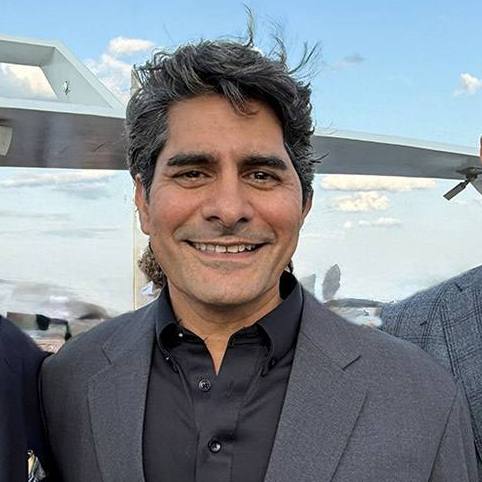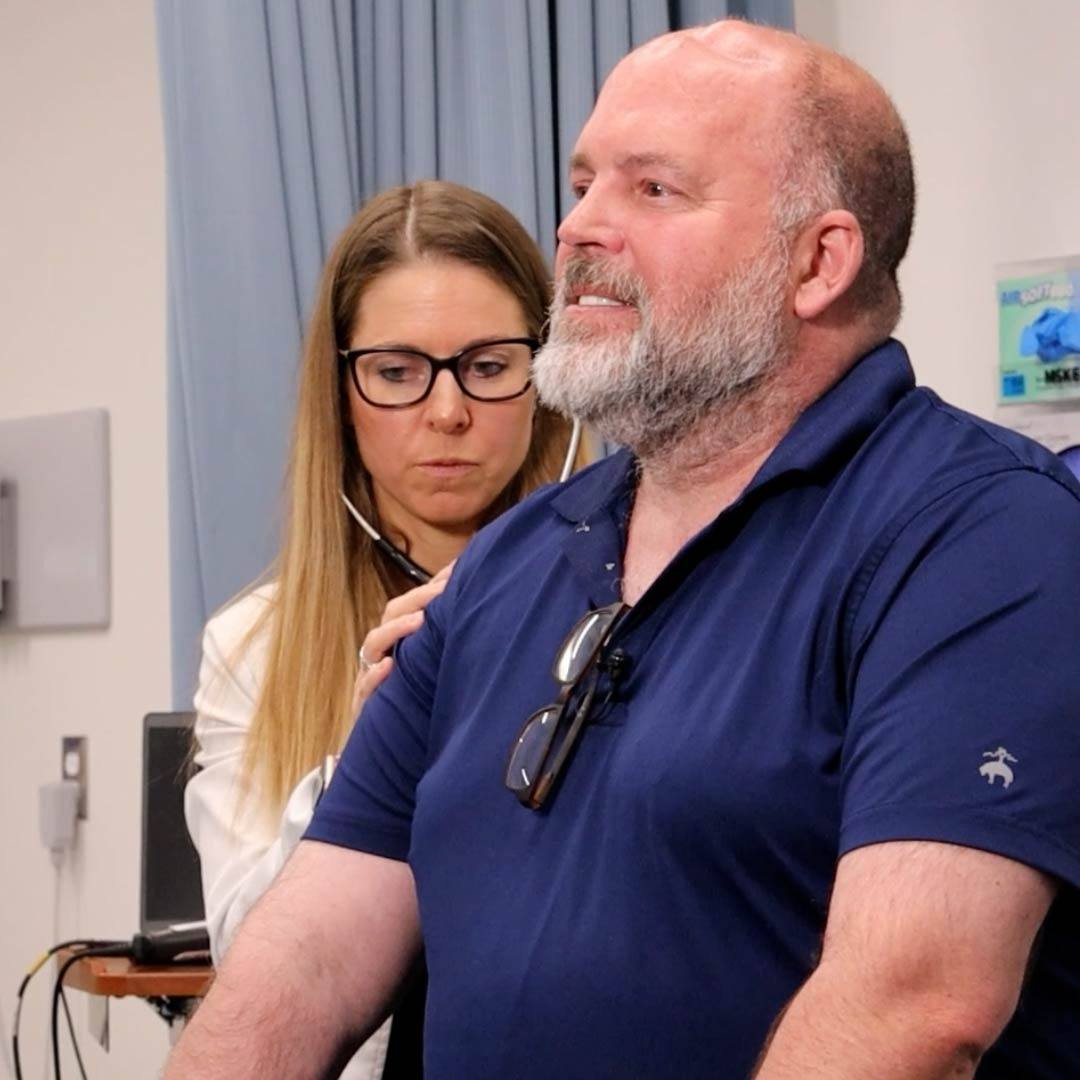Affected by a rare neuromuscular condition, Katie Emerson was beset by extreme muscle weakness that affected her ability to eat, speak and move. Then her mother learned about a Mayo Clinic physician whose pioneering research into Katie's condition gave the child a chance at normalcy.
These days, 3-year-old Katie Emerson is all smiles. The happy toddler loves pushing her toy shopping cart around her family's Mobile, Alabama, home, taking walks with her dad, reading books to her younger sister and eating grapes — her favorite snack.
Up until a few months ago, however, Katie had never done any of those things.
A rare, inherited disease called congenital myasthenic syndrome, or CMS, made Katie's first years of life a daily struggle to survive. The disease is caused by a defect in the way signals are transmitted between nerve and muscle cells. Because it results in extreme muscle weakness, the disorder had limited Katie's ability to move, speak and eat. Even though she was being treated for her disease, Katie struggled to thrive.
All of that began to change when Katie's mother, Tara, heard about Andrew Engel, M.D., a neuromuscular specialist in the Department of Neurology at Mayo Clinic whose pioneering research into the genetics and treatment of congenital myasthenic syndrome resulted in new, more targeted medications for the disorder.
In May, Katie was seen by Dr. Engel and his counterpart in Pediatric Neurology, Duygu Selcen, M.D. At her appointment, Katie was prescribed a medication that counters the disease process specific to her mutation. Not long after Katie's first dose of the drug, Tara noticed something different about her daughter.
"The first time I saw my daughter smile was after she took this drug," Tara says. "[Dr. Engel] literally gave us her first smile and her first steps and gave her some self-esteem. And hope. She's not depressed watching all the other kids run around and feel like she can't do it. She's like a little bird in a cage that's been set free."
Severe symptoms
Almost immediately after Katie was born in May 2015, her pediatricians noticed something was wrong . Katie's breathing was abnormal, and she struggled to eat. For her first week of life, Katie stayed in the pediatric ICU in her hometown facility where physicians closely monitored her. They found Katie had hypotonia, or decreased muscle tone, but didn’t offer any treatments and sent her home.
For the first month of her life, Katie could only eat about 1 ounce of breast milk per feeding. Tara fed her baby every hour, but Katie didn't gain weight. Her physicians recommended Katie receive an amino-acid based formula. Tara made the switch. But a month passed, and Katie failed to thrive.
"Everyone was telling me that if I let her get hungry, she'd eat. I was like, no, she's hungry, but it hurts her to eat."
Tara Emerson
"She wasn't gaining weight. Her hair was falling out. She looked like a skeleton. It was awful," Tara says. "Everyone was telling me that if I let her get hungry, she'd eat. I was like, no, she's hungry, but it hurts her to eat."
Katie was eventually hospitalized for a month. She received a nasogastric feeding tube and was tested for common muscular conditions. When testing did not reveal any obvious disease, Katie was discharged with a diagnosis of a milk allergy.
During her hospitalization, it became clear that Katie had trouble swallowing. Not only did this problem make eating difficult, it made swallowing saliva nearly impossible, Tara says. As a result, Katie often choked on her own secretions and required suctioning. Her father, Jeff, devised a manual suction device that didn't require electricity and could be carried with Katie to and from her appointments. That device, says Tara, quickly and easily cleared the mucus and saliva that got stuck in Katie's nose, mouth and throat.
Rare diagnosis
When Katie was about 6 months old, Tara and Jeff brought her to a facility in Birmingham, Alabama, where she received a gastronomy tube. More importantly, she received genetic testing for rare neuromuscular diseases. Katie's results were positive for a variant of congenital myasthenic syndrome known as a fast-channel CMS.
 "The doctor gave us the medicine and said we'd know in a matter of minutes if it works," Tara says. "So we gave it to her the next day. It was the first time I was able to see her eyes. Up until then, her eyes were like slits. Her eyelids would barely open and her eyelids would droop, which is called ptosis."
"The doctor gave us the medicine and said we'd know in a matter of minutes if it works," Tara says. "So we gave it to her the next day. It was the first time I was able to see her eyes. Up until then, her eyes were like slits. Her eyelids would barely open and her eyelids would droop, which is called ptosis."
In addition to having the muscular strength to open her eyes, Katie found her voice following her initial doses of the drug. "So she screams, and I run over to her, and she laughs. And that's all I hear for the rest of the day," says Tara. "I'd never heard my baby make a noise, and it was a sort of scary."
Over the next year, Tara and Jeff diligently worked with Katie to teach her how to swallow. She worked with physical therapists to learn how to roll, sit and scoot.
"But she couldn't really pull herself up or stand. She was very smart but not very strong, and she wasn't getting to the next level," says Tara, who had joined several support groups by that time. "So I'm in the CMS support group, and everyone started talking about Dr. Engel and Mayo Clinic."
Jeff and Tara researched the work Dr. Engel had done developing gene-specific medications for congenital myasthenic syndrome. At present, there are more than 30 known genes that, when mutated, cause the disease. After learning that other children with Katie's disease variant all seemed to flourish after receiving treatment recommended by Dr. Engel, Tara, with the support of Katie’s local neurologist, requested an appointment for her daughter.
Individualized medicine
Unlike the experience they had with other medical specialists they'd visited, when Tara and Katie arrived at Mayo Clinic for Katie's exam in the Division of Child and Adolescent Neurology, Tara did not have to explain her daughter's condition to the doctors or ask questions about her child's treatment plan.
"This is the first time that I've been to a hospital that I didn't have to ask them anything," Tara says. "I got to be a mom, to not talk, and be quiet and listen. I got to learn and was able to trust them. I got to be able to hand her off for a serious procedure and walk away not worried."
From the way Katie's nurses addressed her aversion to the blood pressure cuff to the simple explanations provided by Dr. Engel, each moment was steeped in compassionate care.
"With Katie's mutation, it wasn't clear which medication would help more. But with the experience of Mayo Clinic, we were able to prescribe the correct medication."
Duygu Selcen, M.D.
"It was about addressing her tiny emotional needs that other people feel are irrelevant," Tara says. "[Dr. Engel] really cared, and you could tell he really cared."
Following the appointment, Katie was prescribed a newer medication shown to be effective in increasing muscular function in children with her specific mutation. According to Dr. Selcen, with congenital myasthenic syndrome, it's critical to give mutation-specific medication because some medications can actually worsen symptoms of the disease.
 "With Katie's mutation, it wasn't clear which medication would help more," Dr. Selcen says. "But with the experience of Mayo Clinic, we were able to prescribe the correct medication."
"With Katie's mutation, it wasn't clear which medication would help more," Dr. Selcen says. "But with the experience of Mayo Clinic, we were able to prescribe the correct medication."
The drug works by creating more of the chemical that's essential to transmitting nerve signals to the muscles. As a result, Katie has more endurance, less fatigue and will be able to build up muscular strength, Dr. Selcen says.
Rapid results
Each day, four times a day, Katie now receives the medication. As she grows, the amount of the drug she receives will increase with her weight. She is closely monitored by her local neurologist, who is an important member of Katie’s care team.
The difference in their daughter since visiting Mayo Clinic is a 180-degree turnaround, Jeff says.
"When I picked them up from the airport, we stopped to get something to eat. Katie was able to sit down beside me by herself and eat," Jeff says. "That wouldn't have happened before. Since then, she's been able to gain muscle. She's walking now, unassisted. It's a snowball effect in the right direction."
"We've been very blessed, and I feel like I have my dream team with Dr. Selcen and Dr. Engel."
Tara Emerson
These days, Katie can walk as much as 6 feet independently. She now sings the songs, such as "You Are My Sunshine," that Jeff has been singing to her since she was born.
"She has needs, but it's routine at this point," Tara says. "We've been very blessed, and I feel like I have my dream team with Dr. Selcen and Dr. Engel. They are team players, and that is so essential to improving these disorders that are so complex and rare."
HELPFUL LINKS
- Learn more about congenital myasthenic syndrome.
- Visit the Department of Neurology.
- Check out the Division of Child and Adolescent Neurology.
- Explore Mayo Clinic.
- Request an appointment.








